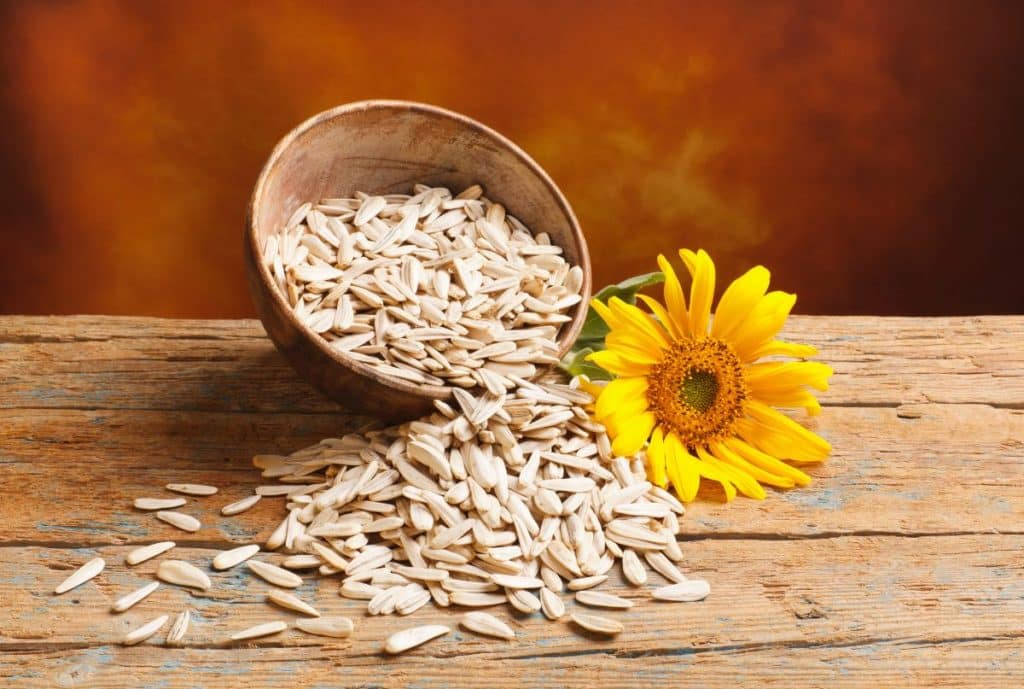
Looking for a health-promoting snack? Enjoy a handful of mild nutty-tasting sunflower seeds with their firm but tender texture to take care of your hunger and get a wealth of nutrition at the same time. Here are five amazing health benefits that sunflower seeds offer:
Very high in potassium
Potassium is an essential mineral that is needed by all tissues in the body. It is sometimes called an electrolyte because it carries a small electrical charge that activates various cell and nerve functions.
A potassium-rich diet may help reduce blood pressure and water retention, protect against stroke, and help prevent osteoporosis and kidney stones. As part of the nervous system, your brain also needs potassium. The mineral allows brain cells to communicate with each other and with cells that are farther away.
If you don’t have enough potassium in your body, your muscles can get weak. You might feel tired and have cramps or constipation.
You’ll probably think of bananas if someone tells you to eat more potassium. But sunflower seeds contain more than double the amount of potassium than bananas: 710mg of potassium per 100g, which works out at 213mg per 30g. However, sunflower seeds (unsalted) are low in sodium — one cup of sunflower seeds contains only 4mg of sodium.
Excellent source of vitamin E
Sunflower seeds are an excellent source of vitamin E, the body’s primary fat-soluble antioxidant. Vitamin E travels throughout the body neutralizing free radicals that would otherwise damage fat-containing structures and molecules, such as cell membranes, brain cells, and cholesterol.
Vitamin E has also been shown to reduce the risk of colon cancer, help decrease the severity and frequency of hot flashes in women going through menopause, and help reduce the development of diabetic complications. In addition, vitamin E plays an essential role in the prevention of cardiovascular disease.
Very good source of vitamin B1
Vitamin B1 is a vital member of the B-complex family and has many important health benefits. Among the many benefits of vitamin B1 is its ability to increase blood circulation and provide a greater supply of oxygen to the blood cells. In addition, vitamin B1 is known to help with the proper metabolism of carbohydrates, making it vital to good digestion.
Many foods are good sources of B1 or thiamin, but sunflower seeds rank among the top five; the others are asparagus, green peas, flax seeds, and Brussels sprouts. A 1/4 cup of sunflower seeds contains 47% of the daily value for B1.
Only small amounts are stored in the liver, so a daily intake of thiamin-rich foods is needed.
Good source of magnesium
Sunflower seeds are a good source of magnesium.
About 60 percent of the magnesium in your body is found in bone, while the rest is in muscles, soft tissues, and fluids, including blood. Magnesium is needed for bone structure, nerve and muscle activity, energy release, body temperature regulation, fat metabolism, and protein synthesis.
Numerous studies have demonstrated that magnesium helps reduce the severity of asthma, lowers high blood pressure, prevents migraine headaches, and reduces the risk of heart attack and stroke.
Do you need magnesium? Signs include muscle cramps in the legs or feet, twitches, aching muscles, migraine headaches, dental pain, brain fogging, anxiety or irritability, and restless legs.
Good source of selenium
Sunflower seeds are a good source of selenium, a trace mineral of fundamental importance to human health.
Evidence from prospective studies, intervention trials, and studies on animal cancer models has suggested a strong inverse correlation between selenium intake and cancer incidence. Selenium has been shown to induce DNA repair and synthesis in damaged cells, inhibit the proliferation of cancer cells, and induce their apoptosis, the self-destruct sequence the body uses to eliminate worn-out or abnormal cells.
Sunflower seeds can be sprinkled on salads, used in baking bread and cookies, and can be baked in vegetable casseroles to add protein flavor and crunch. As with most seeds, sunflower seeds are best eaten raw — they’re higher in nutrition than roasted and better than salted seeds..

